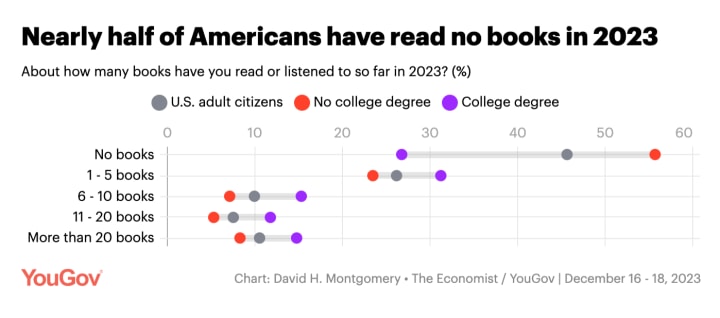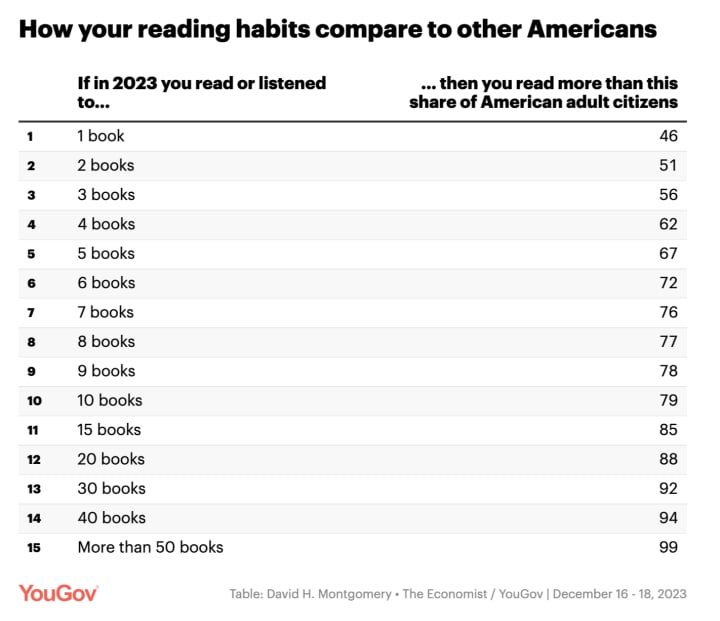The One Book Challenge for Americans
If you’re in education, the latest data on America’s reading habits - or the lack thereof - is depressing, but not surprising. There is some hope though that books - physical books - might be leading a historic reading comeback.

“The more that you read, the more things you will know. The more that you learn, the more places you’ll go.” ---- Dr. Seuss
Introduction
Well, it’s the end of January. How are you doing on those New Year’s Resolutions that you made? If you’re like most of us human Americans, not so well, eh? Maybe you did start going to the gym and exercising - or maybe you didn’t? Maybe you gave up sweets and/or tried to go Keto - or maybe you didn’t? Maybe you made it through “Dry January” - or maybe you didn’t? Maybe you dropped that bad habit that you wanted to get rid of - or maybe you didn’t? Maybe you read that book - or maybe you didn’t?

Reading a book. Reading any book. That’s a bridge too far for many, many Americans today. And so a common New Year’s Resolution that many Americans make - and you may be someone who did this year - is to simply read a book. As you can see in Figure 1 (New Year, New Me: What America Wants to Change in 2024), the notion of reading more is something that many Americans want to do. Yeah, sure, more Americans want to save more money, lose weight, get in shape, and be physically and mentally healthy than to read a book, but as the graphic shows, a healthy portion - approximately 15% - of the American public did make reading more one of their New Year’s Resolutions.
Figure 1 - New Year, New Me: What America Wants to Change in 2024

Source: Chartr, “New Year, New Me: What America Wants to Change in 2024,” January 2024 (Used with permission)
Read a Book (Any Book!)
But what is more reading? Well, you might be surprised that the meaning of “reading more” means reading at all - at least reading a book (yes, a single book) for almost half of all Americans! In an age where we arguably spend more time looking at screens and ostensibly “reading,” we are, in truth, reading less and less, at least when it comes to reading books.
As you can see in Figure 2 (Number of Books Read by Americans in 2023), 46% of all Americans said that they had not read a book - a single book in any form - in the past year (2023). Beyond that, 26% of our fellow citizens responded that they had read one book, while 10% said that they had read 1-5 books in 2023. Among those who were definitely more read than their countrymen and women, 10% of Americans said that they had read 6-10 books, 8% said that they had read 11-15 books, and yes, 11% said that they had indeed read more than 20 books in the past year. Table 1 (A Breakdown of Americans’ Reading Habits in 2023) shows that if
Figure 2 - Number of Books Read by Americans in 2023

Source: YouGov, “54% of Americans Read a Book This Year,” December 21, 2023 (Used with permission)
you read a single book in 2023, then you read more than the 46% of Americans who did not choose to read a - a - book last year. And as Table 1 shows, the more books one reads, those percentages go up - waaaaaaaay up! Just for example, if you read or have listened to 5 books, then you are more read than two-thirds of your fellow Americans, and if you have read 10 books, then you have outreach almost 4 in 5 of your fellow citizens. Clearly then, just the simple act of reading or listening to a single book during the course of a year is a bold act today, one that indeed sets you apart from tens of millions of Americans.
Table 1 - A Breakdown of Americans’ Reading Habits in 2023

Source: YouGov, “54% of Americans Read a Book This Year,” December 21, 2023 (Used with permission)
Now, as we well know today, consuming the content of a book can be done in multiple ways. is not just done via the act of reading a physical book, by listening to that content in an audiobook or reading a digital book on your phone, tablet, or specialized reading device as well. As you can see in Figure 3 (Book Reading by Format, 2023), 42% of those Americans who reported reading at least one book reported doing so in physical form, as opposed to digital books (21%) or audiobooks (19%). These same 2-to-1 ratios held true both in the aggregate and across gender and educational status, approximately double the percentage of Americans report consuming books by reading physical copies of them, as opposed to reading them in digital form or listening to them in audio format. And as Figure 4 (Number of Books Read by Format, 2023) reveals, those who consume
Figure 3 - Book Reading by Format, 2023

Source: YouGov, “54% of Americans Read a Book This Year,” December 21, 2023 (Used with permission)
books in digital format tend to have more voracious appetites for book content than those who read physical books and/or listen to audiobooks. In fact, the stats for those who primarily read physical books and those who listen to audiobooks almost perfectly track one another.
Figure 4 - Number of Books Read by Format, 2023

Source: YouGov, “54% of Americans Read a Book This Year,” December 21, 2023 (Used with permission)

Analysis and Discussion
What does all of this mean in terms of education. As a strategic management professor who is “of a certain age,” I can certainly tell you that from my personal experience, the whole notion of reading has changed markedly over the past decade or even more. We tend to be voracious consumers of information today, reading a great deal, but as the statistics show, we are reading social media posts and articles on the web far more frequently than we are spending time actually reading from - or listening to - books. We are reading more “stuff” than ever today, but reading books far less.
Now, I’m not going to go all “angry old professor” here and wish for simpler times when books were valued more than Tweets, Facebook posts, and blog entries, but there is really no going back. We have changed our media, and overall, we have together changed for the better. But books still have their place in the educational mix, even though today’s students - trust me - do not see books - even textbooks - as having special value. Books are seen as the equivalent of other media that they see in print on their screens, period, even though the thought and research behind a book may be 1, 2, 3, 100, 500 times greater than a blog post or social media entry from “BigMan69!”
What are the solutions to the dearth of book reading among Americans today? While this is a problem much bigger than just the realm of education, education will play a key role in any reading renaissance that might occur. We talk a great deal about media literacy in the world of education, and we need to keep talking about it to emphasize just how different a book is from other forms of the written word that surround us - and often invade our space - today. We need to remind students, from kindergarten through elementary school, middle school, and high school and on into their college years about the value of reading - truly reading - and that means books. While our attention spans are indeed shorter and our options for information are far greater than ever before, we do need to emphasize - at every turn - the difference between a book - in whatever format - and all other forms of media in print. If we fail to do so, we may really risk not just the literacy of American society but the workability of the educational process, as without textbooks as a guidepost, and yes, increasingly they will be in digital format, the ability to structure courses and curricula will be severely hampered going forward. We should promote reading - real book reading (or at least listening) - as the future of American education - and yes, America itself, could well depend upon it.
++++++++++++++++++++++++++++

++++++++++++++++++++++++++++++++
About David Wyld
David C. Wyld is a Professor of Strategic Management at Southeastern Louisiana University in Hammond, Louisiana. He is a management consultant, researcher/writer, publisher, executive educator, and experienced expert witness. You can view all of his work at https://authory.com/DavidWyld. You can subscribe to his Medium article feed at: https://davidwyld.medium.com/subscribe.
Social Media Links to David Wyld:
* on Facebook
* on LinkedIn
* on Threads
* on Twitter (X)
* on Post
About the Creator
David Wyld
Professor, Consultant, Doer. Founder/Publisher of The IDEA Publishing (http://www.theideapublishing.com/) & Modern Business Press (http://www.modernbusinesspress.com)






Comments (1)
Great piece. It sometimes can be hard to find time to read. I do read constantly- either news articles or science ones; books from the library (and those make me read fast, you know, there is DUE DATE!!). I have stopped myself from doing the one click Amazon purchase for my Kindle - I realized I had lots on the Kindle I have not read - I prefer paper books over electronic and can’t read electronic before bed. I plan to read this Kindle books during daylight and the others before bed. Over the years I have frequently had 2-3 books going at the same time. I hope more people find the joy or reading. Read, or write? Go outside, or write? Watch a movie with spouse or read? 😱